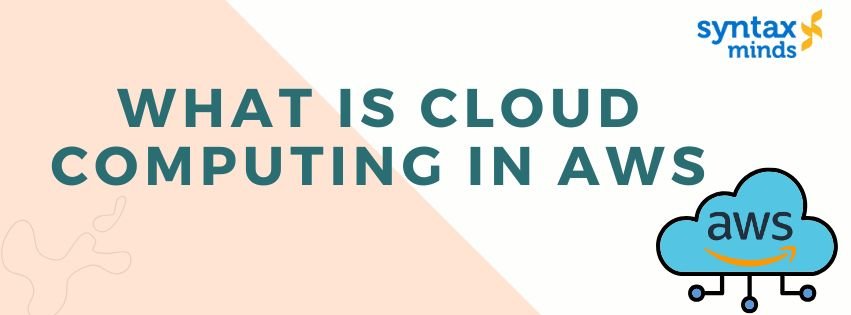Table of Contents
ToggleCLOUD COMPUTING IN AWS
What is Cloud Computing in AWS?
Cloud computing refers to the provision of computing services over the internet, including infrastructure (such as virtual machines and storage), software (like applications), platforms for building applications, and databases. With cloud computing, businesses can access and use computing resources on-demand, avoiding the need to purchase and maintain physical hardware or infrastructure. Amazon Web Services (AWS) is a leading cloud platform, providing a comprehensive range of services and tools that enable businesses and developers to create, manage, and scale applications efficiently. developers to build, manage, and scale applications and systems without heavy upfront investments.
Overview of AWS (Amazon Web Services)
AWS is a subsidiary of Amazon that provides a comprehensive and evolving cloud computing platform. It was launched in 2006 and has since grown to become the market leader in the cloud services industry. AWS provides a vast range of cloud-based products, including computing power, storage options, and machine learning tools, all hosted on Amazon’s data centers around the world.
One of the key features of AWS is its pay-as-you-go pricing model, meaning customers only pay for the services and resources they actually use, making it highly cost-effective for businesses of all sizes. Additionally, AWS allows users to quickly scale up or down based on demand, providing high flexibility.
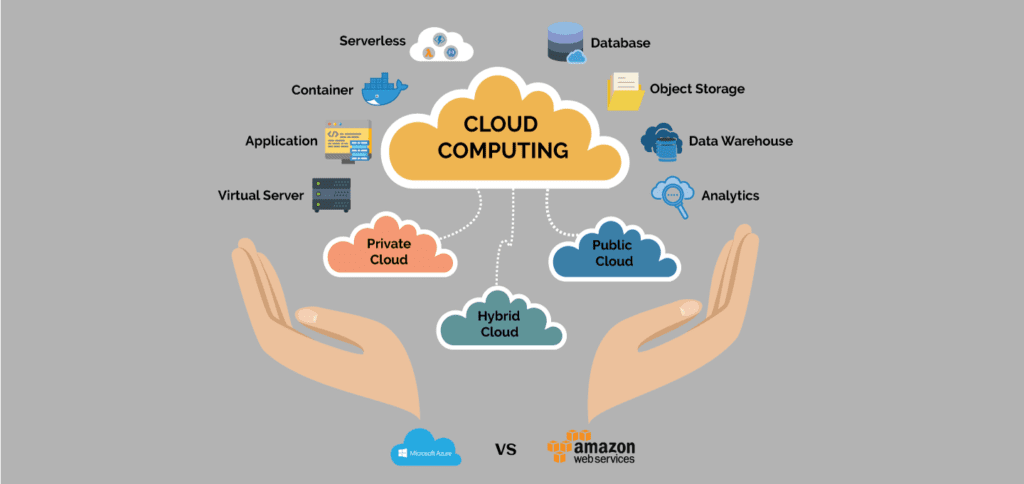
Key Components of AWS Cloud Computing
AWS provides a broad set of services and products that can be categorized into several core areas:
Compute Services
Compute services are at the heart of cloud computing, as they allow users to process data, run applications, and perform tasks without managing physical servers. In AWS, some of the primary compute services include:
- Amazon EC2 (Elastic Compute Cloud): EC2 allows users to rent virtual servers (instances) to run applications. It provides various instance types tailored to specific needs (e.g., CPU, memory, and storage). EC2 instances can be quickly launched, terminated, or scaled based on demand, making it a highly flexible option for workloads.
- AWS Lambda: Lambda offers a serverless computing model where developers can run code in response to events without provisioning or managing servers. Users pay only for the compute time consumed during the execution of the function.
- Amazon Elastic Beanstalk: This is a platform-as-a-service (PaaS) offering that automatically handles the deployment, from capacity provisioning to load balancing and scaling, for web applications. Users simply upload their code, and Elastic Beanstalk automatically manages the infrastructure.
Storage Services
Storage is one of the essential pillars of cloud computing. AWS offers a range of storage solutions designed to address different needs, from simple file storage to complex data analytics.
- Amazon S3 (Simple Storage Service): S3 is an object storage service that allows users to store and retrieve large amounts of data. It is commonly used for backup, archiving, and content distribution. It provides high durability and scalability and is designed to handle an immense number of objects.
- Amazon EBS (Elastic Block Store): EBS provides block-level storage volumes for EC2 instances. EBS is useful for databases, file systems, and applications that require persistent storage. The volumes can be resized and reattached to different instances easily.
- Amazon Glacier: Glacier is a low-cost cloud storage service designed for data archiving and long-term backup. While retrieval times can be slower, it is highly cost-effective for large volumes of infrequently accessed data.
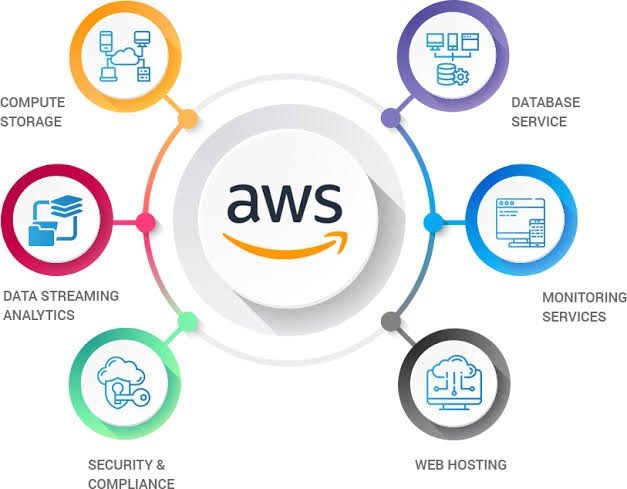
Networking Services
AWS offers several tools for managing and optimizing network architecture. Networking services ensure that applications can connect securely, scale efficiently, and deliver high performance across regions.
- Amazon VPC (Virtual Private Cloud): VPC enables users to create isolated network environments within AWS. It allows users to control their virtual network, including IP address range, subnets, route tables, and network gateways. This is useful for isolating environments and managing security.
- Amazon Route 53: This is a scalable Domain Name System (DNS) service that can route user requests to different endpoints based on factors like geographic location or load. It supports both public and private DNS.
- Elastic Load Balancing (ELB): ELB automatically distributes incoming application traffic across multiple targets, such as EC2 instances. It helps ensure high availability and fault tolerance by preventing any single server from being overwhelmed with too much traffic.
Database Services
AWS offers both relational and NoSQL database services, making it suitable for a wide variety of applications. Some of the most popular database services include:
- Amazon RDS (Relational Database Service): RDS supports multiple database engines, including MySQL, PostgreSQL, Oracle, and SQL Server. It automates common database tasks like backups, patching, and scaling.
- Amazon DynamoDB: DynamoDB is a managed NoSQL database that provides fast and predictable performance at scale. It is ideal for applications requiring low-latency data access and scalability.
- Amazon Aurora: Aurora is a high-performance relational database engine designed for cloud environments. It is compatible with MySQL and PostgreSQL but offers enhanced performance and availability.
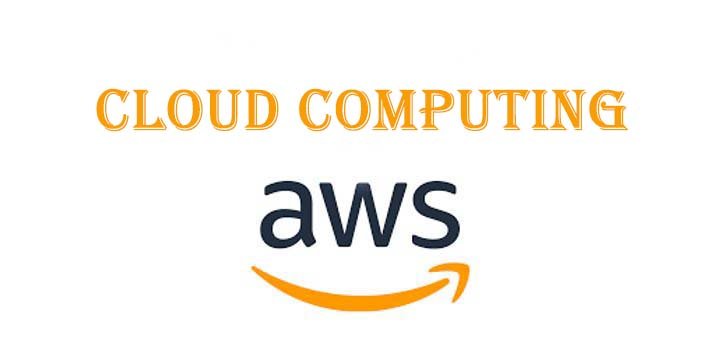
Security and Identity Management
Security is a top priority in cloud computing, and AWS provides several tools to help secure data, control access, and meet compliance standards.
- AWS IAM (Identity and Access Management): IAM helps manage user access to AWS resources. Users can be granted permissions based on roles, which allows fine-grained control over who can access specific services and resources.
- AWS Shield: AWS Shield is a managed DDoS protection service that helps safeguard applications from distributed denial-of-service attacks, ensuring higher availability and business continuity.
- AWS Key Management Service (KMS): KMS allows users to manage cryptographic keys for securing data. It can be integrated with many AWS services to enforce data encryption.
Machine Learning and AI Services
AWS provides a rich set of tools for machine learning (ML) and artificial intelligence (AI) that are designed to scale and integrate with other AWS services.
- Amazon SageMaker: SageMaker is a fully managed platform for building, training, and deploying machine learning models. It helps reduce the complexity of managing ML workflows and provides a suite of pre-built algorithms and tools for experimentation.
- Amazon Rekognition: Rekognition is a service that enables image and video analysis, including object detection, facial recognition, and sentiment analysis.
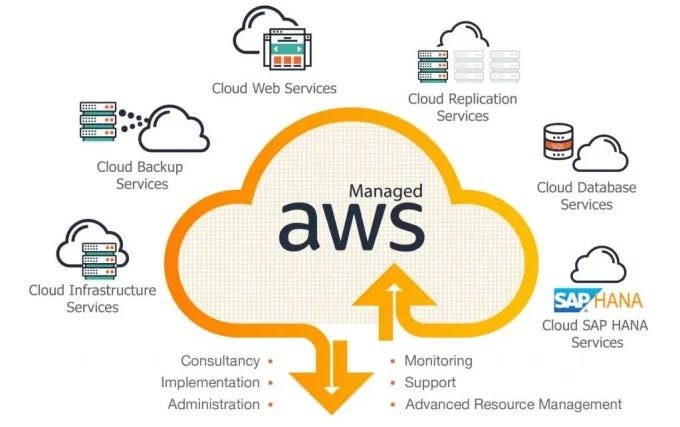
Developer Tools and Analytics
AWS provides a wide array of tools that help developers streamline the application development process and analyze data effectively.
- AWS CodePipeline: A continuous integration and continuous delivery (CI/CD) service that automates the build, test, and deployment phases of software development.
- Amazon Kinesis: Kinesis is a suite of services for real-time data streaming and analytics. It can process large amounts of streaming data from sources like logs, social media, and IoT devices.
Benefits of Cloud Computing in AWS
- Cost Efficiency: AWS offers a pay-as-you-go model where users pay only for the resources they consume. There are no upfront costs, and you can scale your usage as needed.
- Scalability and Elasticity: AWS enables businesses to scale their applications up or down based on demand. Services like EC2 and Elastic Load Balancing allow automatic scaling to ensure performance even during traffic spikes.
- Global Reach: With a network of data centers around the world, AWS allows businesses to deploy applications across multiple regions, improving performance and disaster recovery capabilities.
- Security: AWS offers a wide range of security features, including data encryption, identity management, and network security, ensuring that users can meet compliance requirements and protect their data.
- Innovation and Agility: AWS provides access to cutting-edge technologies like artificial intelligence, machine learning, and big data analytics, allowing organizations to innovate faster.

Conclusion
AWS has revolutionized cloud computing by offering a broad, scalable, and reliable platform that enables businesses to focus on building and growing their applications rather than managing infrastructure. Whether you’re hosting a website, processing big data, or building advanced machine learning models, AWS offers the tools, services, and flexibility to meet the needs of modern enterprises. The accessibility, scalability, and cost-efficiency of AWS make it a leading choice for businesses of all sizes looking to leverage cloud computing.

